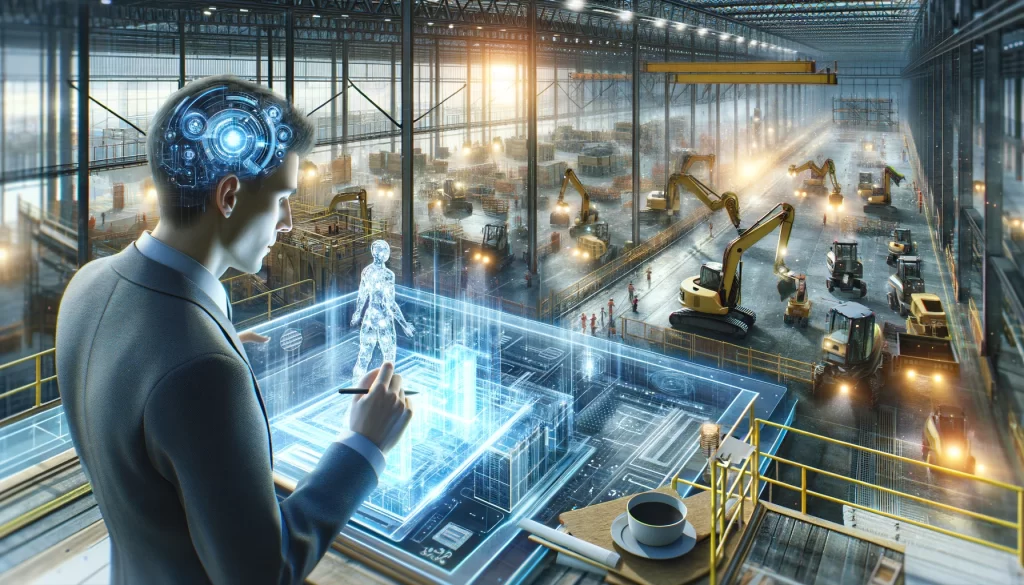AI-Powered Procurement: Revolutionizing Construction
A I • May 03,2024

Imagine a world where construction materials and services are procured without errors, supply chains function flawlessly, and cost savings reach incredible numbers. This is not a fantasy, but a reality that is rapidly approaching thanks to the fantastic power of artificial intelligence (AI).
Unlike the dot-com boom of the late 1990s—which was based on unfounded expectations—artificial intelligence (AI) is not just a buzzword but a revolutionary technology that is changing all areas of our lives, including construction procurement.
Whether you are a professional who faces the challenges of construction procurement every day or are simply interested in the role of AI in today’s business, this article will help you better understand how this technology is shaping construction procurement.
Gear up for a knowledge-packed journey!
1. Next-gen Procurement with AI
Getting construction materials from plan to pavement involves more than a few steps and quite a crowd of players. Imagine AI as your brilliant shopping buddy—it’s changing the game by finding what you need faster and improving the value you get from purchases.
1. 1. Streamlining Sourcing Workflow
Streamlined RFQ Creation
Construction procurement is getting an automation upgrade, with AI software acting as your personal “RFQ architect.” These brainy tools can whip up RFQs independently, crunching project details, material needs, past purchase info (think cost comparisons), and existing templates. This automation saves time and effort and guarantees that your RFQs are clear, concise, and perfectly tailored to your specific project needs. Talk about efficiency!
Bid Evaluation & Supplier Screening
Construction procurement is getting more innovative with automation. Think AI algorithms sifting through tons of data on suppliers, past bids, and market trends to find the best bids for your project. Procurement folks can even create multiple award scenarios to pick suppliers more fairly and efficiently, minimizing the chances of bias or errors and saving everyone time and money. Bonus: these brainy sourcing systems keep learning so your construction firm stays ahead of the curve.
AI-Powered Supplier Negotiation
Construction procurement is taking supplier negotiation to the next level with the help of AI. Think brainy machines doing the initial negotiation rounds with suppliers, using fancy tricks like natural language processing and sentiment analysis to get the best deals.
Not only do AI robots take the first stab at negotiating with suppliers, but procurement teams also get a super-powered upgrade! With AI, they access intelligent insights derived from past supplier negotiation patterns, real-time data on supply market conditions, and “should-be” costs—knowledge that empowers them to make intelligent decisions and score the best deals during negotiations.

1.2. Ensuring Efficiency and Control
Data-Driven Contracts
AI tools crunch tons of contract data and past supplier performance information to find the best deal terms for your project and the hidden “gems” (beneficial clauses) in contracts. Think of AI acting like a contract detective, spotting loopholes and hidden opportunities to save you money.
Moreover, it notifies you of potential concerns, such as expiration dates, and enables the implementation of automated payment triggers based on predetermined project milestones and performance metrics.
AI-powered Cost Control
Uh oh! Project budgets can be surprised by maverick spending—unexpected costs like unplanned materials or price hikes. Construction firms are implementing clear procurement policies with pre-vetted vendors and leveraging artificial intelligence to counter this.
AI programs can analyze past purchases and supplier info to find the best deals and flag any suspicious spending. Imagine a robot accountant hunting down sneaky expenses! By closely monitoring maverick spending, construction projects can run smoother and stay on budget.
Accurate MDM
Master data management (MDM) is like your construction site’s data organizer. It uses cutting-edge tools to gather information about suppliers, materials, projects—everything! Think of it as cleaning up your messy toolbox and putting everything in its place.
In today’s world, MDM uses technologies like deep learning models to handle all that unstructured data and turn it into actionable insights. No more struggling with complex spreadsheets! Thanks to the advancements in NLP and generative AI techniques, construction companies can now automatically classify and enhance their data. This lets them find the best suppliers, run things smoothly, and make smarter decisions: it helps them build better and faster!
Real-world Examples
Let’s dive into how companies are harnessing the power of AI to revolutionize their procurement strategies:
EnBW: Automating Negotiations with AI
EnBW, a leading energy company, has embraced Procure AI’s Augmented Procurement Platform to automate supplier negotiations. This AI-powered solution streamlines the negotiation process, adhering to predefined criteria and optimizing prices, quantities, and delivery terms in real-time.
Teichert: Optimizing Bids with Machine Learning
Teichert, an infrastructure and site development contractor, has implemented InQuarry, an AI platform from Launch Data & AI Studio. Tailored to Teichert’s specific needs, InQuarry utilizes machine learning to analyze past projects and identify potential errors or omissions in current bids. This AI-driven review empowers Teichert to refine its bidding process, resulting in more competitive proposals.
Siemens: Expanding Supplier Networks with AI
A global technology powerhouse, Siemens has integrated Scoutbee, an AI-powered platform that taps into a vast global supplier database. The platform’s AI algorithms enabled Siemens’ procurement team to swiftly identify a diverse pool of suppliers (over 90 in just one week), including entirely new options within specific categories.

2. Real-Time Inventory Tracking and Monitoring
Real-time Updates on Inventory Levels
No more scrambling to find that last bag of nails! In addition to making procurement smoother, AI also helps with tracking all your building supplies. Construction sites and warehouses can become overflowing with materials, and manually tracking everything can be a nightmare (and prone to mistakes!).
AI tech comes to the rescue with real-time tracking systems. These systems allow you to easily access accurate details about the materials you have available at any given time: no more guesswork, just clear info to keep your projects on track.
Improved Planning and Delay Prevention
AI’s not just a stock-taker, it’s a planning pro, too! AI algorithms can crunch data from different sources like RFID tags, sensors, and barcode scanners. This lets them constantly give you up-to-the-minute details about the quantity and whereabouts of materials.
You see precisely what you have and where in real-time! With instant access to inventory levels, construction companies can effectively plan their procurement and prevent costly delays caused by material shortages.
Just-in-time Inventory Replenishment
AI can also become your personal materials manager, using “just-in-time” techniques. AI takes a peek at all your past data and what’s happening on-site. Based on this information, it predicts when you’ll need more supplies and automatically triggers orders for them—just in time!
This keeps your projects running smoothly because you always have what you need when you need it. No more scrambling for missing parts or wasting money on a warehouse full of extra stuff. AI keeps your inventory levels just right, saving you time and money.
Real-world Examples
The theory sounds exciting, right? Now is the time to see artificial intelligence in action! Let’s look at real-life examples of how companies use this innovative technology to revolutionize inventory management.
API Group: Warehouse Optimization with AI
API Group, a large printing company in the US and UK, employs a custom AI solution from Kortical. This solution analyzes historical data to forecast future demand for materials. AI optimizes stock levels based on these forecasts, preventing shortages and surpluses. This ensures that API Group can deliver orders to its customers on time. By implementing Kortical’s solution, API Group reduced excess inventory by 8.5% and increased on-time deliveries by 11%.
Mahindra: Smarter Inventory with AI Forecasting
Mahindra, a leading spare parts manufacturer, utilizes Blue Yonder’s Luminate Planning platform to optimize inventory management with AI power. Blue Yonder’s solution enhances demand forecasting accuracy, enabling Mahindra to streamline inventory levels and prevent stockouts or overstocking. AI analyzes data and provides inventory recommendations based on predefined demand and supply parameters. Mahindra’s planners can accept or override these recommendations, considering additional insights.
Walmart: AI-Powered Inventory Optimization
The global retail leader, Walmart uses innovative technologies to optimize its inventory. By analyzing historical data, AI predicts future demand for goods, allowing the company to purchase the required quantity and avoid shortages or surpluses. AI also automates the processes of storing, removing, and packing goods, significantly increasing the efficiency of warehouse operations.
Even negotiations with suppliers are now conducted with the help of AI chatbots. This saves time and resources and allows Walmart to negotiate better supply terms and reduce costs.
3. Benefits of AI in Procurement
Sorry to sound like a broken record, but AI’s advantages in procurement are unparalleled. In the construction industry, several key areas are to benefit the most from the positive impact of AI:
Decision-making: AI uncovers hidden insights from data, improving purchasing decisions and risk management.
New opportunities: AI identifies cost savings, market trends, and underutilized suppliers.
Operations: AI streamlines complex workflows with minimal disruption.
Automation: AI handles repetitive tasks like invoice processing, freeing up human time for strategic roles.
Time-saving: AI reduces workload, allowing teams to focus on strategic procurement activities.
Finding suppliers: AI identifies new suppliers based on cost, reliability, and delivery times.
Stronger relationships: AI fosters data-driven interaction and communication with suppliers.
Bottom Line
Construction procurement is getting a high-tech makeover thanks to artificial intelligence (AI). Believe it or not, AI is not a fleeting craze; it’s here for the long haul and bringing about tangible change.
For those who juggle many tasks—like keeping an eye on inventory, tackling complex procurement jobs, searching for suppliers, and conducting negotiations—AI solutions come to the rescue. Thanks to this tech, construction companies can smooth out their operations, prevent human errors, and save money from start to finish on any project.
Previos Article Unveiling the Benefits of AI in Pre-Construction
Next Article AI in Construction Monitoring: From Cost Control to Risk Mitigation